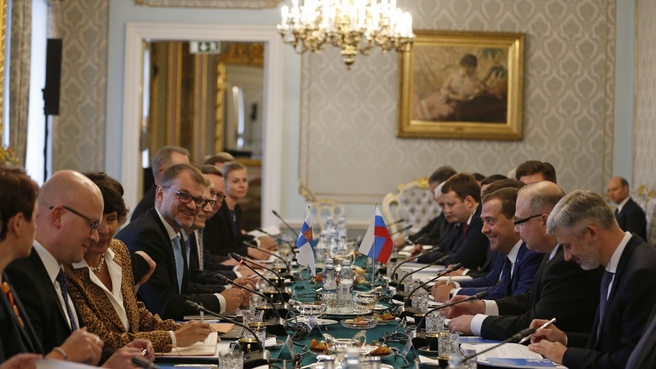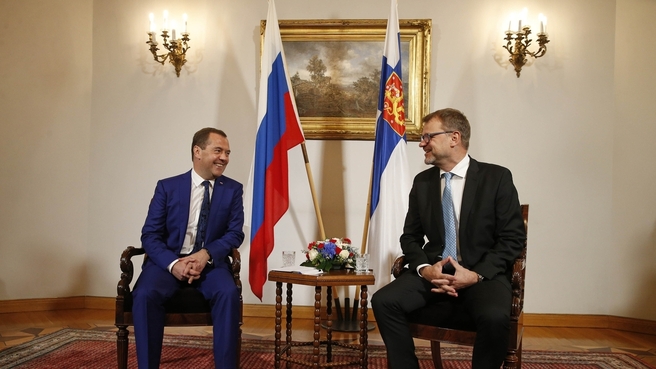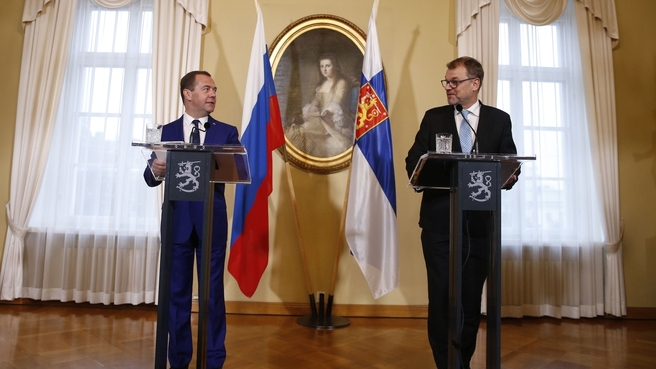Russia-Finland talks.
Joint news conference by Dmitry Medvedev and Juha Sipilä following the talks
Excerpts from the transcript:
Juha Sipilä (via interpreter): Today, Mr Medvedev and I have held frank and constructive talks regarding bilateral relations between Finland and Russia. We discussed the economy and the environment, as well as relations between the European Union and Russia, and the regional and international situation. The last time Prime Minister of the Russian Federation and I met was a year ago in St Petersburg. At that time, we marked the 100th anniversary of Finland’s independence. Dialogue between our countries also continues this year. Our presidents met this past summer in Helsinki and in Sochi. For us, the prime ministers, this is the fourth meeting.
Our countries maintain very close contacts between people. Russian citizens are the largest and most numerous group of foreign tourists in Finland.
This week, the city of Savonlinna will host a cultural forum between our countries.
Tourism between our countries is growing all the time. Last year, we recorded nine million border crossings. In this respect, we are lagging behind the all-time high of 13 million crossings, posted in 2013.
We also discussed environmental matters, which, as you know, are unaffected by state borders. For many years, our consistent and purposeful cooperation helped improve the state of the Baltic Sea. Mr Medvedev and I also discussed our countries’ commitment to implementing agreements under the Paris Agreement on climate change.
The reduction of soot or black carbon emissions is a central issue when we talk about slowing down climate change processes. Finland will try to hold another Arctic summit until the end of its presidency of the Arctic Council. Efforts to promote specific measures for reducing black soot emissions are one of our main goals.
Finland and the Russian Federation also cooperate in the area of waste management. During our current meeting, we discussed the Krasny Bor hazardous waste landfill and in a broader context, that is, cooperation in the area of waste management. Finnish companies have excellent technological competences and experience in this sector, and we agreed to promote this cooperation in the future.
We also conducted a good discussion of trade and economic relations between our countries. Finnish-Russian trade remains about the same as last year. We posted very good growth last year, and trade expanded appreciably. But it should be noted that a negative balance is being posted in Finland’s trade with Russia.
Finnish companies have invested a total of 12 billion euros in the Russian economy, and new projects are currently being implemented.
Taking into account Finland’s population, it is the largest per-capita investor in Russia. Although difficulties and problems emerge from time to time, Finnish companies are determined to implement long-term projects on the Russian market.
Today, Finnish company Valmet and Russia’s Sveza Group have signed a protocol of understanding as regards a modern pulp factory that will be built in Russia. Environmental factors and efforts to minimise the environmental impact will be prioritised during construction of this facility.
We also discussed the construction of the Hanhikivi-1 nuclear power plant. Finland always puts safety at the top of the list. All sides and all participants consider it very important that the project proceeds normally, that all plans regarding this should be realistic, and that they meet all the requirements requested by the official authorities.
When we talk about cooperation between neighbouring countries, streamlined border cooperation, of course, plays a very important role. In this context, we must pay tribute to our border authorities who cooperate on an excellent basis with each other. Speaking of legislation on temporary car imports, things are really speeding ahead in the right direction here.
Shipping volumes in the Gulf of Finland continue to increase every single year. At the same time, this spells out additional risks as well as disasters. Finland would like to cooperate more closely with Russia in the sphere of high-seas rescue operations. Not a single Baltic region state has the required high-seas rescue potential for addressing problems that might arise during large-scale disasters.
Speaking of international affairs, we discussed matters regarding the Ukrainian conflict and Syria. Finland is concerned about the situation of civilians, and we are worried as to how sustained solutions of these conflicts will be reached. Other matters of concern to us include the threat of spreading hostilities to new territories and apprehensions that many people will suffer in Syria’s Idlib region. Russia bears special responsibility for preventing the escalation of violence.
The conflict in eastern Ukraine also influences relations between the European Union and Russia to some extent. And the development of these relations depends on this conflict’s resolution. In this context, Russia also acts as a central and important player.
The European Union and Russia are still neighbours. And Finland has always noted that dialogue plays a key role when it comes to these matters, too.
Civil society level contacts are also of upmost importance. My colleague and I have agreed that all the remaining matters (that we did not have time to discuss) will be brought up when we get together this evening. We will also touch upon subjects discussed during the talks which took place between ministers.
Dmitry Medvedev: We have had productive, wide-ranging talks. It is our fourth meeting. We met twice in St Petersburg, once in the Prime Minister’s home town of Oulu. This is the best evidence that the most diverse issues can be resolved bilaterally even at a time when the Russian Federation and the European Union have fairly complicated relations.
Finland remains our reliable and constructive partner. By joint efforts, we have reversed the downturn in bilateral trade from two or three years ago. Trade is now growing. This is a direct result of more intensive efforts.
In this case, we compare our relations with Finland to 2013 because mutual trade peaked back then. And we still have to get back to those numbers. The task we set ourselves is to make Russia Finland’s top trading partner again, as it was some time ago. We are currently in third place trailing Germany and Switzerland. The key role here belongs to business – both fairly big businesses, as well as small and medium-sized businesses. Indeed, Finnish companies are quite active in the Russian market. They launch new projects, which we greatly appreciate. The Prime Minister said Finland’s investments amount to 12 billion, but according to our data, the number is 14 billion. I don’t know where the other two billion got lost but I hope the numbers properly reflect the situation with investments.
We have major partners such as, for example, the Fortum concern which is operating in Russia, carrying out a number of very significant projects. The construction of the Hanhikivi 1 nuclear power plant, a large Russian project in Finland, was mentioned here. We discussed it today, including schedule issues. An important benchmark is issuing the construction licence for next year. The work should be accelerated, though it is a commercial project, of course. And we expect the shareholders will be actively involved in this work.
I would like to thank our partners and Finland in general for the proactive position on Nord Stream 2. Work has been underway on Finland’s part of the pipeline since 5 September.
The timber industry boasts substantial prospects. Indeed a cooperation memorandum regarding the planned construction of a pulp mill in the Vologda Region has been signed on the sidelines of our talks. This, too, is an ambitious project with high environmental standards.
There are some interesting and mutually beneficial initiatives in the industry and in the field of construction, telecommunications and education as well. On the whole, we will, naturally, continue to work on a number of projects.
We have discussed environmental and nature conservation cooperation in great detail. The reclamation of the Krasny Bor dump containing dangerous waste, located near St Petersburg, is on the agenda. Finnish waste disposal technology might also come in handy. Russia perceives this job as very topical nowadays. By the way, Mr Prime Minister and I will visit a plant for decontaminating and recycling dangerous household rubbish after this news conference.
We will certainly continue to work on some of the initiatives within the Arctic Council. In this respect, we support Finland’s proposals in the Nordic Dimension format, including efforts to reduce black-soot and methane emissions. Russia has got quite a few ideas and proposals when it comes to this.
We are actively involved in border cooperation too. We have a programme which will take us up to 2020. A protocol on crossing the state border entered into force in July. This was preceded by active work involving our border services, and we must thank them for this. We will also address a number of matters on the verge between border cooperation and customs clearance, including temporary car imports, mentioned by Mr Juha Sipilä.
The citizens of our countries continue to expand their communications and contacts, with Russian citizens started visiting Finland more frequently. Last year’s trips involved over three million people. Although we have so far failed to hit an all-time high level reached in 2013. Nevertheless, we are expecting more Russian tourists to go to Finland and vice versa.
We have discussed a number of international and regional matters (Mr Prime Minister has already noted this), including those linked with the situation concerning the Middle East and Syrian developments. I would like to point out that Russia is really interested in overcoming the civil conflict that had flared up in Syria as soon as possible; moreover, problems linked with the existence of terrorist hotbeds and manifestations in Syria must be resolved once and for all. I would like to note just one thing: of course, the Syrian Government, as well as a number of countries involved in resolving this conflict, one way or another (including the Russian Federation, the United States of America, Israel, Turkey, Iran, as well as some other states), must also assume responsibility for developments in this case.
Regarding the resolution of the civil conflict in Ukraine, we have exchanged information about and opinions on the developments in that country. Obviously, firm political will, primarily on the part of the Ukrainian government, rather than statements that the Minsk process is dead, and that it is necessary to look for other formats, is needed to overcome the tragic situation that has taken shape in Ukraine.
We have discussed some other cooperation matters.
I would like to thank Mr Prime Minister for the traditionally open atmosphere at our meeting, for the talks that we have conducted and for his hospitality. I hope that such contacts will continue. We will meet again today, and we will discuss some other aspects that we have not so far brought up.
Question: We know that Russia and Finland are discussing opportunities for new joint environmental projects. Would you give us more specifics about these projects and the timeframes?
Dmitry Medvedev: We have already said a few words about this. Indeed, Finland has very advanced waste disposal technology and very high environmental standards in general. So this is definitely a great area for cooperation.
Speaking about the most recent agenda, the main project is perhaps the Krasny Bor hazardous waste landfill. We have reached an agreement on this problem and will very shortly begin to discuss the format of cooperation involving Rosatom on Russia’s side, Fortum and probably some other companies on Finland’s side. In any case, this is a complicated and important project for our country and Finland also sees it as such. The most important prerequisite is that this project is already included in the national environmental programme and funds have been allocated for this purpose. This means we are moving from discussing this matter (and frankly speaking, this discussion has been going on for more than one decade) to practical implementation.
I would also like to mention a few points that we covered. They include reducing soot and methane emissions. Here I want to point out that Russia has also made its own suggestions, including those from Gazprom. There are a number of technology concepts for solving this problem in the Arctic, including abating petroleum gas flaring and injecting this gas into a formation, which creates an environmental effect and a completely different situation. We will look into this.
Juha Sipilä (via interpreter): Indeed, building waste disposal facilities in St Petersburg was a successful project. It really affected the Baltic Sea environment. Now we are discussing another project, which is reclamation of the Krasny Bor landfill. We already used our Finnish technology there to take samples and conduct analysis. My colleague mentioned the problem of soot emissions. But I would like to elaborate on the cooperation in waste management. In Finland, only 3 percent of waste ends up in landfills while 40 percent is recovered and recycled, and 50 percent is burnt. We have many opportunities for cooperation in this field. We have a lot we can offer. As concerns petroleum gas flaring and the resulting soot emissions, my colleague also covered that.
Question (via interpreter): In Finland the public’s attention has been drawn towards the investigation in relation to Ariston Helmi being conducted in the area of the city of Turku on the archipelago. People fear that Russia, under certain circumstances, might use the infrastructure build on the islands – for example, helicopter pads – for military purposes. How might the respected heads of government respond to these public concerns? How could Russia help the investigation into suspected money laundering? My next question is to the Prime Minister of Finland. What assistance does Finland expect to receive, should it want, in the context of this investigation?
Dmitry Medvedev: The investigation conducted in Finland is Finland’s affair, not Russia’s. Finland has been a sovereign state for quite a long time now. Investigate whatever you want; it’s your internal affair. If a corpus delicti, including money laundering, is really in evidence, this is a crime under Russian law as well. All the procedures under Finnish procedural law must be observed. If a request for assistance is addressed to the Russian law enforcement agencies, this help, as is only natural, will be provided. But given that the investigation affects a Russian citizen, we, naturally, hope that he will enjoy all the terms envisaged by law. He can also have consular support.
As for the helicopter pads, this is a case of paranoid delirium. What comments can be expected here? I don’t even know what to say. Where does this come from? Whose inflamed brain has conceived this?
Juha Sipilä (via interpreter): This topic was not on our official agenda. You are speaking about a police case; an investigation is in progress and it is not yet over. There are suspicions of money laundering and major tax evasion. A Russian and an Estonian have been taken into custody in this context. This case has no effect on relations between Russia and Finland. I have no information that might force us to apply for assistance in this investigation. There is no reason for that. Let me join in what my colleague said on this.













